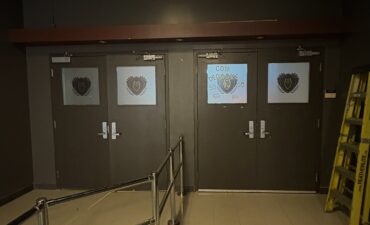
The University of Regina has suffered through significant financial losses due to the COVID-19 pandemic — as much as $6 million — but is now getting a revenue boost by hosting seven WHL teams in the campus bubble.
The university’s 2021-22 Operations Forecast shows the school took a significant hit with the loss of ancillary revenues; that is, revenue from residences, cafeteria meals and parking. According to the financial forecast, the revenue loss comes from a decrease in international student tuition fees, reduced athletic fees and very few students living on campus.
The total revenue shortfall projected during the 2020-21 fiscal year is $6,059,000.![]() The hosting of the WHL teams created a positive impact for both the university and the city, especially to local rental facilities and food suppliers. University Vice-President Dave Button said the main reason for hosting the teams was to bring business back to the city itself.
The hosting of the WHL teams created a positive impact for both the university and the city, especially to local rental facilities and food suppliers. University Vice-President Dave Button said the main reason for hosting the teams was to bring business back to the city itself.
“We were glad to accommodate not only the athletes, but the city,” said Button.
The university’s residences hosted a month-long stay for about 210 players plus coaches and support staff. To avoid intermingling of players, each team had its own floor at the residences, with five teams at the U of R and two at Luther College, which is right across a parking lot. Regina Pats captain Logan Nijhoff is grateful his team could play again.
“My overall experience in the bubble has been unbelievable,” said Nijhoff. “We can’t thank the City of Regina, WHL, and Luther College enough for allowing this to happen”.
The contract was calculated by bed-space, earning the university approximately $100,000 with 100 per cent of the earnings coming from the residences.
Based on the approval of health officials, the U of R was fully confident there would be no risk to students living on campus. Partaking in a mandatory quarantine period upon arrival, the players had meals delivered to their rooms.
Luther’s cafeteria was responsible for providing meals to the teams. Dr. Marc Jerry, President of Luther College, said institutions across Canada are struggling with their financial models due to the loss of student residences and food services. Luther itself has experienced a substantial revenue hole.
“We don’t have very many student residents,” said Jerry. “Residents and the food services have been very important to Luther’s financial plan.”
Food services planned and prepared by Luther have been very helpful to the school’s finances. Sourcing local products whenever possible, Bob Crowe, food and beverage manager at the college, said the total cost of the meals was calculated in a contract.
“We came up with the menu and the schedule way before anything started,” said Crowe. “They played 24 games in 49 days. So we wanted to come up with a menu that was not just nutritionally balanced but also something they didn’t get tired of.”
With the players spending plenty of time on the ice, Crowe came up with a menu that was carbohydrates heavy. Setting up the meals buffet style, they were served depending on game and practice time, with some meals served as early as 7 a.m. and as late as 7 30 p.m. Following safety protocols, each team had its own dining space.
Serving breakfast, lunch, and dinner for just over a month, the contract was set at $40,000 per team. With seven teams, this brought Luther College roughly $280,000.
The University of Regina and Luther College said the teams were respectful and polite. Understanding the financial aspect of hosting the WHL mini-season, the players seemed grateful, according to Crowe.
“They are very thankful that the WHL went to the efforts to put the work into this. This is costing each team a significant amount of money so I think the players realize that this is something that’s special,” said Crowe.
https://www.youtube.com/watch?v=Grrke_sPs7A&list=PLwpkg5DWMdFf0exvkUEjkEvwAGBOFbDGz














